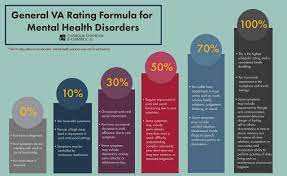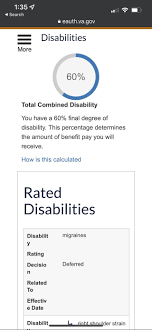VA Disability Benefits for Mental Health: Supporting Our Veterans
When we think about the sacrifices made by our military veterans, we often focus on the physical toll that their service can take. However, it is equally important to recognize and address the mental health challenges that many veterans face. The Department of Veterans Affairs (VA) provides disability benefits specifically for mental health conditions, ensuring that our veterans receive the support they need.
Mental health issues among veterans can stem from a variety of factors, including combat exposure, traumatic experiences, and the challenges of transitioning back to civilian life. These conditions can have a profound impact on their daily lives, affecting their relationships, employment opportunities, and overall well-being.
The VA recognizes the significance of mental health conditions and offers disability benefits to eligible veterans who experience them. To qualify for these benefits, veterans must provide evidence that their mental health condition is connected to their military service. This evidence can be in the form of medical records, statements from healthcare professionals, or personal accounts detailing how their service contributed to their condition.
Once approved for disability benefits related to mental health, veterans receive compensation based on the severity of their condition and how it affects their ability to work and carry out daily activities. This financial support can be crucial in helping them access necessary treatment options and support services.
In addition to financial assistance, the VA provides comprehensive mental health care services tailored specifically for veterans. These services include counseling, therapy sessions, medication management, and access to specialized programs designed to address conditions such as post-traumatic stress disorder (PTSD), depression, anxiety disorders, and substance abuse.
The VA’s commitment to supporting veterans with mental health conditions extends beyond just providing treatment. They also focus on raising awareness about these issues among both veterans and the general public. By reducing stigma surrounding mental health in the military community, they encourage more individuals to seek help when needed.
It is important for veterans experiencing mental health challenges to understand that they are not alone. Through the VA, they have access to a network of professionals dedicated to their well-being. Additionally, there are numerous veteran support organizations and communities that provide a sense of camaraderie and understanding.
If you or someone you know is a veteran struggling with mental health issues, it is essential to reach out for help. The VA offers a variety of resources, including the Veterans Crisis Line, which provides immediate support 24/7. Remember, seeking assistance is a sign of strength, and there are people ready to assist you on your journey towards recovery.
In conclusion, mental health conditions among veterans deserve our attention and support. The VA’s disability benefits for mental health play a vital role in ensuring that our veterans receive the care they need and deserve. By providing financial assistance and comprehensive mental health services, we can help our veterans lead fulfilling lives after their honorable service to our country. Let us stand together in supporting those who have sacrificed so much for us all.
5 Essential Tips for Managing VA Disability Mental Health
- Make sure to stay organized and keep track of all your medical records, including any information related to mental health issues.
- Talk to a qualified mental health professional about your disability-related concerns and ask questions if you don’t understand something.
- Take advantage of available resources such as support groups or online forums for veterans with mental health issues.
- Reach out for help if needed; there are many organizations that provide free or low-cost counseling services specifically for veterans with mental health issues.
- Practice self-care by doing activities that make you feel relaxed, such as yoga, meditation, or journaling.
Make sure to stay organized and keep track of all your medical records, including any information related to mental health issues.
Staying Organized: A Key Tip for VA Disability Mental Health Claims
When it comes to applying for VA disability benefits for mental health issues, one crucial tip that can greatly improve your chances of success is to stay organized and keep track of all your medical records. This includes any documentation related to your mental health condition.
Why is staying organized so important? Well, the process of applying for VA disability benefits can be complex and time-consuming. Having a well-organized collection of medical records will not only make it easier for you to provide the necessary evidence but also ensure that you don’t miss out on any crucial information.
Start by gathering all your medical records, including diagnoses, treatment plans, therapy notes, and medication history. Make sure you have copies of everything. It’s also helpful to maintain a chronological record of your mental health journey, noting significant events or changes in symptoms along the way.
Creating a filing system specifically dedicated to your VA disability claim can be incredibly beneficial. Organize your documents by category or date, making it easy to locate specific information when needed. Consider using folders or digital storage options to keep everything in order.
In addition to medical records, it’s essential to keep track of any relevant supporting documentation. This may include statements from family members or friends who have witnessed the impact of your mental health condition on your daily life. Any letters from healthcare professionals or therapists attesting to the severity and connection between your military service and mental health are also valuable evidence.
By staying organized and keeping meticulous records, you’ll be better equipped to present a comprehensive case when applying for VA disability benefits. It demonstrates seriousness and dedication towards obtaining the support you deserve as a veteran.
Remember that the VA relies on evidence-based assessments when evaluating disability claims. Providing complete and well-documented information about your mental health condition will help ensure an accurate evaluation of its impact on your life.
If you’re unsure about how to organize or gather your medical records, don’t hesitate to reach out for assistance. Veterans Service Organizations (VSOs) or legal professionals specializing in VA disability claims can provide guidance and support throughout the process.
In conclusion, staying organized and keeping track of all your medical records is a valuable tip when applying for VA disability benefits related to mental health issues. By doing so, you increase your chances of a successful claim and ensure that you present a comprehensive case to the VA. Your dedication and effort will help you receive the support you need as a deserving veteran.
Talk to a qualified mental health professional about your disability-related concerns and ask questions if you don’t understand something.
Talking to a Qualified Mental Health Professional: A Key Step in Navigating VA Disability for Mental Health
Navigating the process of applying for VA disability benefits for mental health can be complex and overwhelming. To ensure that you understand your rights and receive the support you deserve, it is crucial to engage with a qualified mental health professional who can guide you through the process.
When it comes to discussing your disability-related concerns, a mental health professional with expertise in working with veterans can provide valuable insight and support. They are well-versed in understanding the intricacies of mental health conditions commonly experienced by veterans, such as PTSD, depression, or anxiety disorders.
By reaching out to a qualified mental health professional, you gain access to their knowledge and experience. They can help you navigate the VA system, explain the requirements for disability benefits, and assist you in gathering the necessary documentation to support your claim.
During your conversations with a mental health professional, don’t hesitate to ask questions if something is unclear or if you need further clarification. Understanding the details of your disability claim is essential for ensuring that you provide accurate information and present a strong case.
These professionals can also provide valuable guidance on how to effectively communicate your experiences and symptoms when completing forms or attending medical evaluations. They can help you articulate how your military service has impacted your mental health and daily functioning, which is crucial for establishing a connection between your condition and your time in service.
Furthermore, engaging with a qualified mental health professional offers an opportunity for emotional support throughout this often challenging process. They can provide coping strategies tailored to your specific needs while helping you address any barriers or concerns that may arise along the way.
Remember that seeking assistance from a qualified mental health professional demonstrates strength and self-advocacy. Their expertise will empower you as you navigate the complexities of VA disability benefits for mental health conditions.
In conclusion, talking to a qualified mental health professional is an essential step when dealing with VA disability for mental health. They can provide guidance, answer your questions, and offer emotional support throughout the process. By working together, you can ensure that your concerns are addressed, your rights are protected, and you receive the support you need on your journey toward obtaining the benefits you deserve.
Take advantage of available resources such as support groups or online forums for veterans with mental health issues.
Take Advantage of Available Resources: Support Groups and Online Forums for Veterans with Mental Health Issues
When it comes to managing mental health issues, support from others who have shared similar experiences can make a world of difference. For veterans dealing with mental health challenges, support groups and online forums specifically designed for them can be invaluable resources.
Support groups provide a safe and understanding environment where veterans can connect with others who have faced similar struggles. These groups offer a space to share stories, exchange coping strategies, and provide emotional support. Being able to relate to others who truly understand the unique challenges that come with military service can be immensely comforting and empowering.
Online forums offer a convenient way for veterans to connect virtually, especially for those who may face geographical limitations or prefer the anonymity of online interactions. These forums allow veterans to engage in discussions, ask questions, and receive advice from a diverse community of individuals who have firsthand knowledge of mental health issues in the military context.
Participating in support groups or online forums can bring several benefits. Firstly, it helps combat the feeling of isolation that often accompanies mental health struggles. Connecting with fellow veterans who have faced similar challenges reminds individuals that they are not alone on their journey towards healing and recovery.
Secondly, these platforms provide an opportunity to learn from each other’s experiences. Veterans can gain valuable insights into different treatment approaches, coping mechanisms, and available resources that they may not have been aware of otherwise. Learning from others’ experiences can help individuals navigate their own path towards better mental well-being.
Lastly, being part of a supportive community fosters a sense of belonging and camaraderie. It allows veterans to build meaningful connections with others who share common backgrounds and experiences, creating a network of support that extends beyond just the group or forum itself.
To take advantage of these resources, veterans can start by reaching out to local VA facilities or veteran service organizations to inquire about support groups in their area. Additionally, there are numerous online platforms specifically tailored for veterans, such as forums, social media groups, and websites dedicated to mental health support.
Remember, seeking support is not a sign of weakness but a courageous step towards self-care and improvement. By connecting with others who have walked a similar path, veterans can find solace, encouragement, and practical guidance in their journey towards better mental health.
In conclusion, support groups and online forums provide valuable resources for veterans dealing with mental health issues. These platforms offer a sense of community, understanding, and shared wisdom that can greatly enhance the healing process. By taking advantage of these available resources, veterans can find comfort in knowing they are not alone and gain valuable insights from those who have faced similar challenges. Let us encourage each other to seek the support we need and deserve on our path to recovery.
Reach out for help if needed; there are many organizations that provide free or low-cost counseling services specifically for veterans with mental health issues.
Reaching Out for Help: Counseling Services for Veterans with Mental Health Issues
When it comes to mental health, seeking support is a crucial step towards healing and recovery. This is especially true for our military veterans who may be dealing with the lasting effects of their service. If you are a veteran experiencing mental health issues, it’s important to know that there are organizations out there that offer free or low-cost counseling services specifically tailored to your needs.
The Department of Veterans Affairs (VA) provides an extensive range of mental health services, including counseling, therapy, and support programs. These services are designed to address conditions such as post-traumatic stress disorder (PTSD), depression, anxiety disorders, and substance abuse. The VA understands the unique challenges faced by veterans and aims to provide them with the specialized care they deserve.
In addition to the VA, numerous nonprofit organizations also offer counseling services for veterans at little or no cost. These organizations recognize the sacrifices made by our veterans and strive to provide them with the necessary support. They understand that mental health issues can significantly impact a veteran’s quality of life and work tirelessly to ensure they receive the care they need.
When considering counseling services, it’s essential to find an organization that specializes in working with veterans. These professionals have a deep understanding of military culture and the unique experiences that come with serving in the armed forces. They can provide a safe space where veterans can openly discuss their challenges without fear of judgment or misunderstanding.
Many of these organizations offer individual counseling sessions as well as group therapy options where veterans can connect with others who have had similar experiences. Group therapy provides an opportunity for shared understanding and mutual support among fellow veterans who can truly empathize with one another.
To access these resources, reach out to your local VA medical center or vet centers in your area. They can guide you towards reputable organizations that offer free or low-cost counseling services for veterans. Additionally, online directories and helplines can provide valuable information on available resources.
Remember, reaching out for help is a sign of strength, and there are dedicated professionals and organizations ready to support you on your journey towards better mental health. Don’t hesitate to take that first step and seek the assistance you deserve. You’ve served our country with honor, and now it’s time to prioritize your well-being.
Practice self-care by doing activities that make you feel relaxed, such as yoga, meditation, or journaling.
Taking Care of Your Mental Health: The Power of Self-Care for Veterans
When it comes to managing mental health, self-care is an essential tool that can make a significant difference in our well-being. For veterans navigating the challenges of mental health conditions, incorporating self-care practices into their daily routine can provide a sense of relief and support. One effective way to promote relaxation and reduce stress is by engaging in activities like yoga, meditation, or journaling.
Yoga, known for its physical and mental benefits, offers a holistic approach to self-care. By combining gentle movements with deep breathing exercises, yoga helps to calm the mind, release tension from the body, and improve overall well-being. It promotes mindfulness and self-awareness while fostering a sense of inner peace and tranquility.
Meditation is another powerful practice that allows us to quiet our minds and find stillness within ourselves. By dedicating even just a few minutes each day to meditation, veterans can experience reduced stress levels, improved focus, and enhanced emotional well-being. Meditation provides an opportunity to detach from negative thoughts or worries and cultivate a sense of clarity and inner balance.
Journaling serves as an outlet for expressing emotions, thoughts, and experiences in a safe space. It allows veterans to reflect on their feelings without judgment or fear of repercussion. Writing down their thoughts can help them gain perspective on their emotions while providing a sense of release and catharsis. Journaling also serves as a valuable tool for tracking progress in personal growth or identifying patterns that may be contributing to mental health challenges.
By practicing these self-care activities regularly, veterans can create moments of respite amidst the daily pressures they may face. Incorporating these practices into their routines not only offers immediate relaxation but also contributes to long-term mental wellness.
It’s important for veterans to remember that self-care is not selfish; it is an act of self-preservation that allows them to better care for themselves and others. Taking the time to engage in activities that promote relaxation and self-reflection can have a profound impact on mental health.
If you are a veteran, consider exploring these self-care practices as part of your journey towards improved mental well-being. Whether it’s finding a local yoga class, using meditation apps or resources, or simply setting aside time for journaling each day, prioritize your self-care. You deserve moments of peace and tranquility as you navigate the challenges of life after service.
Remember, practicing self-care is an ongoing process, and it may take time to find what works best for you. Be patient with yourself and embrace the journey towards holistic wellness. Your mental health matters, and by incorporating self-care into your life, you are taking an important step towards prioritizing your well-being.




